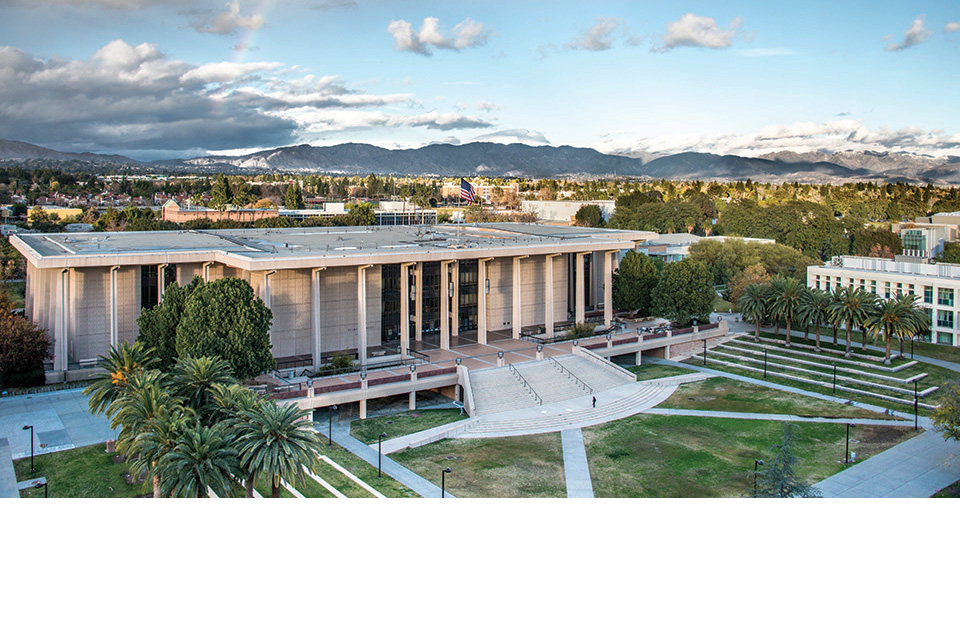CSUN Again Named HSI Leader by Fulbright Program

The designation recognizes the “noteworthy engagement” that selected Hispanic-Serving Institutions have achieved with the Fulbright Program, the U.S. government’s flagship international educational exchange program. Photo by David J. Hawkins.
California State University, Northridge has been named a Fulbright HSI Leader for the third year in a row by the U.S. Department of State’s Bureau of Educational and Cultural Affairs (ECA).
The designation recognizes the “noteworthy engagement” that selected Hispanic-Serving Institutions (HSIs) have achieved with the Fulbright Program, the U.S. government’s flagship international educational exchange program. The initiative encourages administrators, faculty and students at HSIs to engage with Fulbright and highlights the strength of HSIs as destinations for international students and scholars.
Marta Lopez, director of CSUN’s International Programs and International and Exchange Student Center, said the university was pleased to receive the designation for three years running.
“It is an honor for CSUN to have received this nomination for the third year in a row,” Lopez said. “Fulbright presents a distinguished opportunity to the CSUN community. Having been selected as one of the 2023 Fulbright HSI Leaders highlights our achievements and contributions to the Fulbright program.”
The recognized colleges and universities include two associate degree level colleges, five baccalaureate degree awarding colleges and special focus institutions, 14 master’s degree level colleges and universities, and 25 doctoral degree awarding universities. Currently, there are 559 HSIs across the country. For an institution of higher education to be designated an HSI, it must have an undergraduate student enrollment that is at least 25 percent Hispanic.
CSUN will be representing master’s institutions at an upcoming interactive virtual workshop featuring representatives from Fulbright HSI Leaders. The workshop is open to the public and is specifically designed for faculty, staff, and stakeholders at HSIs.
“During this session, Fulbright’s role in campus internationalization efforts and experiences in promoting Fulbright opportunities and culture will be shared,” Lopez said. “We are honored to have been invited to be a part of this presentation representing master’s institutions.”
The Fulbright Program is the U.S. government’s flagship international academic exchange program. Since its inception more than 75 years ago, the Fulbright Program has given more than 400,000 talented and accomplished students, teachers, artists and professionals of all backgrounds and fields the opportunity to study, teach and conduct research abroad, exchanging ideas and contributing to finding solutions to complex international challenges.
Each year, the U.S. Congress appropriates funds to the U.S. Department of State to sponsor the Fulbright Program. Many foreign governments contribute substantially as well. Additional funding and in-kind funding is provided by U.S. and foreign host institutions, non-governmental organizations, private organizations, corporate partnerships and individual donors.
The Fulbright Program has designed and implemented a wide range of initiatives to increase participant diversity and inclusion. The program strives to ensure that its participants reflect the diversity of U.S. society and societies abroad. Fulbrighters come from all backgrounds and are selected through an open, merit-based competition, regardless of their race, color, national origin, sex, age, religion, geographic location, socio-economic status, disability, sexual orientation or gender identity. Information on the Fulbright Program’s diversity and inclusion initiatives is detailed on the Fulbright U.S. Student Program website.
Learn more about Fulbright at https://fulbrightprogram.org, including information about Fulbright’s efforts to further DEIA within the program and about the Fulbright HSI Leaders initiative.

 experience
experience